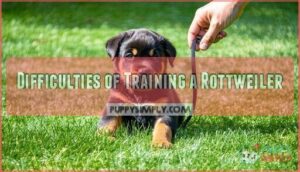This site is supported by our readers. We may earn a commission, at no cost to you, if you purchase through links.
 Are Rottweilers easy to train? In short, yes—if you’re up for a bit of a brain game.
Are Rottweilers easy to train? In short, yes—if you’re up for a bit of a brain game.
Thanks to their smarts and loyalty, Rottweilers quickly catch on to commands, often acing tricks before you’ve even finished your coffee.
But don’t let that fool you; their stubborn streak can pop up like a jack-in-the-box, so you’ll need patience and consistency.
Positive reinforcement works wonders, especially if you pair treats with clear praise.
If you train early and stay calm, you’ll have a reliable companion faster than you can say “sit,” and with the right approach, training can become almost second nature.
Stick around for tips that make training almost second nature.
Table Of Contents
- Key Takeaways
- Rottweiler Trainability Overview
- Why Rottweilers Are Easy to Train?
- Difficulties of Training a Rottweiler
- The Good Outweighs The Bad
- Tips for Training Your Rottweiler
- Are Rottweilers Easy to House Train?
- How Do You Punish a Rottweiler?
- Key Milestones: 6–7 Weeks
- Key Milestones: 8–9 Weeks
- Key Milestones: 4 Months
- Frequently Asked Questions (FAQs)
- When should I start training my Rottweiler?
- Are Rottweilers hard to train?
- Do Rottweilers need training?
- Are Rottweilers good dogs?
- Can a Rottweiler be untrained?
- Do Rottweilers need crate training?
- Are Rottweilers difficult dogs to own?
- Do Rottweilers tend to be aggressive?
- What are the best treats to use when training a Rottweiler puppy?
- How can I stop my Rottweiler from jumping on people?
- Conclusion
Key Takeaways
- You’ll find Rottweilers pick up commands quickly thanks to their intelligence and loyalty, but you need clear, consistent routines for success.
- Start training and socializing early; using positive reinforcement like treats and praise will get you the best results.
- Be patient and calm when stubborn moments pop up—firm but gentle corrections work far better than harsh discipline.
- Their size and strength can be a challenge, so set boundaries early and keep training fun and structured.
Rottweiler Trainability Overview
Nearly everyone who’s worked with Rottweilers knows they’re a treat to train—provided you harness their natural smarts and loyalty.
Rottweilers thrive on teamwork, blending their brilliant minds and loyal hearts into every training session
This breed’s knack for picking up new things will surprise you, thanks to notable canine intelligence and a real drive to bond with their people.
You’ll find that positive training methods, like giving treats or a cheerful “Good job!”, go a lot further than stern words ever will.
Still, keep in mind that those big paws and sturdy frames can make for interesting adventures during obedience sessions.
Successful Rottweiler training tips often hinge on early puppy socialization and building trust.
Stick to clear, consistent routines and reinforce good habits right away.
Over time, you’ll see your efforts blossom into rock-solid rottweiler obedience.
Understanding their status as intelligent dog breeds is essential for effective training approaches.
Why Rottweilers Are Easy to Train?
You’ll find Rottweilers are enthusiastic to learn and genuinely want to please, which can make your life a lot easier.
With their sharp minds and loyal nature, even teaching “sit” or “paw” feels more like playtime than work.
High Intelligence
Rottweilers rank 9th in dog intelligence ranking among 130+ breeds, showcasing exceptional cognitive abilities and learning capacity.
Their high Intelligence Quotient means they master commands in under 5 repetitions versus 25-40 for average dogs. This canine intelligence translates to remarkable problem solving skills and mental stimulation needs that make training sessions productive.
Here’s what their rottweiler intelligence looks like in action:
- Lightning-fast learning – New commands stick after just a few tries
- 95% success rate – They nail commands on the first attempt most times
- Memory champions – Retain 87% of learned behaviors after six months
- Pattern recognition – Quickly connect your hand signals with expected behaviors
- Situational awareness – Read your mood and adapt their response accordingly
This intelligent breed processes training like a sponge absorbs water, making your job easier when you’re consistent with expectations. Like other highly intelligent breeds, Rottweilers require regular mental stimulation and exercise to prevent boredom and destructive behavior.
Loyalty
Building trust isn’t just for the birds—dog training methods thrive on loyalty as much as handshakes do.
A Rottweiler’s devoted nature turns every lesson into teamwork.
You’ll see their loyal behavior shine brightest during bonding techniques, especially when using loyalty training.
Faithful companions with a strong Rottweiler temperament, they’ll focus on you, keen to please thanks to Rottweiler intelligence and trust building.
Positive Encouragement
When loyalty’s already strong, you’ll see big results using reward systems and positive reinforcement in your rottweiler training.
A kind word, a gentle command, or a quick belly rub works wonders.
They thrive when you:
- Use praise techniques (“Good job!”)
- Offer treats for motivation
- Incorporate reward-based training daily
With consistent obedience training, you’ll create a rock-solid bond.
History of Work Obedience
A chain of work ethics runs deep in your Rottweiler’s blood, tracing back to their breed origins as Roman herding pros and trusted butchers’ helpers.
This legacy means they’re no strangers to serious command training or hard jobs—even if their idea of “task mastery” sometimes involves outsmarting you during potty breaks.
With steady dog obedience at the core, you’ll find Rottweilers pick up everyday skills like leash walking, nail care, and obedience training with a can-do spirit few breeds can match.
| Breed Origins | Work Ethics | Task Mastery |
|---|---|---|
| Herding Skills | Obedience Roots | Leash Walking |
| Working Dogs | Dog Obedience | Rottweiler Training |
Difficulties of Training a Rottweiler
You’ll quickly notice that training a Rottweiler sometimes feels like arm wrestling a determined toddler with paws—big strength and even bigger opinions.
Training a Rottweiler is equal parts muscle and mischief—it’s a tug-of-war with a furry, clever teammate
Their size and stubborn streak can make obedience feel like a game of patience, but a calm, steady approach goes a long way, utilizing patience to overcome their strong will.
Size and Weight
Ever tried convincing a stubborn doorstop to heel? That’s training a large breed like a Rottweiler if you skip weight management or ignore their muscle mass.
Their rapid growth rates and hefty body proportions mean you’ll need solid dog training tips—think leverage, not brute force.
Keep Rottweiler size and weight in check for smoother walks and better control.
Stubborn Side
Size and strength aren’t your only hurdles; you’ll also wrestle with that signature Rottweiler stubbornness. These intelligent dogs can act like they didn’t hear you—especially during grooming or when trying to eat everything in sight.
Dealing with strong-willed Rottweiler behavior takes strategy:
- Stay calm and patient.
- Use consistent, positive reinforcement.
- Redirect unwanted habits with clear commands.
Training challenges come standard, but with grit and humor, you’ll outsmart rottweiler stubbornness.
The Good Outweighs The Bad
Sure, Rottweilers can test your patience with their stubborn streak and hefty size, but don’t let that overshadow the real perks.
These dogs are known for their loyalty and work drive, two Rottweiler benefits you’ll notice every day once training starts.
Their natural intelligence makes obedience training a smoother ride—sometimes, they seem to anticipate your next move.
With consistent positive reinforcement and a thoughtful approach to dog training techniques, you’ll see progress that feels downright rewarding.
Early puppy development and socialization tips pay off in spades as your pup becomes more adaptable and confident.
Put simply, the breed characteristics that make Rottweilers a challenge also make them a joy. Stick with it, and you’ll have a partner who works as hard as you do.
Understanding dog breed characteristics is essential for effective training and building a strong bond with your pet.
Tips for Training Your Rottweiler
If you want your Rottweiler to be the best-behaved dog on the block, you’ll need a good mix of patience, clear rules, and plenty of treats.
Training a Rottie is a bit like raising a teenager—stick to positive reinforcement and start early, and you’ll both come out ahead.
Start Young
When you bring home a Rottweiler puppy, kicking off Early Training is like planting seeds for a confident and well-behaved adult dog.
Focus on Puppy Socialization right from the start—let your Young Rottweiler meet new faces and hear common household noises.
Early bonding is your golden ticket to teamwork, so spend lots of time together during key Development Stages.
Rottweiler puppy training isn’t just about commands; it’s about building trust one belly rub at a time.
Effective puppy training at home requires patience, consistency, and positive reinforcement.
- Watching your pup explore the world is pure puppy joy.
- Laughter follows as they stumble into new situations.
- The bond you form now lasts a lifetime.
- Mistakes? They’re just milestones in training a Rottweiler.
Use Only Positive Reinforcement
Starting young sets you up for success, but getting results is all about positive reinforcement.
Think of training as a friendly game where kindness wins.
Reward systems, clicker training, treat motivation, and praise techniques turn your Rottweiler into a willing student.
Skip harsh corrections—gentle correction and calm training work better.
Patience pays off with dog training.
A wagging tail and alert eyes after a treat or “good boy!” says you’re doing it right.
Effective training relies on positive reinforcement methods to strengthen the bond between dog and owner.
| Reward System | Your Result |
|---|---|
| Clicker | Quick Sit |
| Treat | Happy Recall |
| Praise | Tail Wag |
| Toy | Focused Heel |
| Gentle Voice | Calmer Down-Stay |
Join an Obedience Class or Get a Trainer
Choosing a trainer or signing up for obedience classes can take a load off your shoulders and give your Rottweiler a head start.
You’ll see better results with professional guidance and well-structured dog training classes.
Here’s what you’ll gain:
- Professional trainer expertise for tricky obedience commands.
- Puppy socialization with other dogs—be ready for wagging tails.
- Proven training methods that build good habits fast.
Everyone benefits, even the neighbors, with effective dog training that requires understanding of Dog Training Classes.
Are Rottweilers Easy to House Train?
There’s something downright satisfying about watching your Rottweiler “get it” with house training. Their sharp minds and loyalty make potty training surprisingly smooth—if you play your cards right.
Stick to a regular bathroom routine and reward your pup immediately when they go outdoors. Housebreaking tips for quick wins? Consider the following:
- Puppy sniffing the door or pacing means it’s time for a bathroom break.
- A crate helps prevent accidents when you can’t supervise—think of it as their safe den.
- Keep enzymatic cleaner handy, because even star students slip up.
Consistency is key, especially during those first months of house training. Use lots of praise, stay patient, and remember—every Rottweiler is unique, but with the right approach, success is closer than you think. Effective Rottweiler training methods can also make a significant difference in the housebreaking process.
How Do You Punish a Rottweiler?
After getting your Rottweiler house trained, questions about discipline naturally pop up. If you think “How do you punish a Rottweiler?”, keep in mind that Positive Discipline wins, hands down.
Rottweiler training isn’t about old-school scolding or Negative Reinforcement—those only invite stress and mistrust. Instead, focus on Calm Assertiveness and Gentle Correction: say “no” in a steady voice, redirect their attention, and reward the moment they make a good choice.
Redirection Techniques work wonders—if yours starts gnawing a shoe, swap it out for a chew toy. Dogs learn best with structure and clear dog training commands, not chaos.
Your most effective dog punishment?
- Ignore unwanted behaviors like jumping for attention—simply walk away, teaching patience and self-control.
Positive reinforcement shapes good habits far better than fear ever could. You’ll get a well-behaved Rottweiler without turning training into a power struggle.
Key Milestones: 6–7 Weeks
After covering how to manage discipline, let’s look at these early weeks—think of it as a puppy’s first classroom.
Between 6–7 weeks, your Rottweiler puppy learns the ropes from littermate interaction and daily handling.
Puppy socialization starts now, introducing new faces while visitor screening keeps everyone safe from germs.
Growth monitoring matters; you want those eyes bright and tails wagging, which are the building blocks for rottweiler intelligence and positive behavior.
These mini lessons are the foundation that makes rottweiler puppy training much smoother later on.
Key Milestones: 8–9 Weeks
At 8–9 weeks, your Rottweiler puppy is like a tiny sponge, ready to soak up all sorts of new experiences.
This is prime time for Puppy Socialization—let them meet friendly neighbors, sniff around new parks, and get comfy with all sorts of sights and sounds.
Leash Training and Basic Commands start here, too; short, upbeat sessions are best.
Don’t worry if your pup acts like a comedian—nipping and jumping are normal at this stage but should be redirected gently.
Potty Training and Nail Care should become routine.
With Rottweiler intelligence on your side, consistency and patience turn puppy development into a smoother ride.
Rottweiler puppy training at this age sets the tone for a confident, well-mannered dog.
Key Milestones: 4 Months
Four months in, your Rottweiler isn’t just teething on slippers—they’re hitting major dog training milestones. Compared to the goofy puppy weeks, you’ll notice sharper focus and a boost in curiosity about the world.
It’s prime time to ramp up Advanced Training, reinforce Obedience Skills, and brush up on Socialization Techniques. Puppy Development now hinges on respectful guidelines, clear boundaries, and praise that doesn’t sound like a game show host.
Here’s what keeps things on track:
- Practice leash walking around new sights and sounds—let your Rottie sniff and explore, but encourage good manners.
- Keep training sessions fun yet focused; five minutes is plenty at this age.
- Nip nipping in the bud—redirect chewing to toys, not hands.
- Expose them to different dogs and people using safe rottweiler socialization approaches.
Effective training also involves understanding dog training basics to address potential behavioral issues. Patience wins the day—every challenge is a chance for progress!
Frequently Asked Questions (FAQs)
When should I start training my Rottweiler?
Start training your Rottweiler as soon as you bring them home—ideally around 8–9 weeks of age.
Keep sessions short, fun, and consistent, like quick coffee breaks.
Trust me, puppies learn fast when treats are involved!
Are Rottweilers hard to train?
Guiding a Rottweiler is like steering a ship with a strong current—firm hands help, but calm patience wins.
You’ll need consistency, treats, and good timing.
With positive reinforcement, even stubborn moments become teachable, playful triumphs.
Do Rottweilers need training?
You absolutely need to train a Rottweiler.
Think of it as teaching manners to a teenager with super strength.
Without training, they’ll run the show.
With your guidance, you’ll have a loyal buddy who listens and behaves.
Are Rottweilers good dogs?
Ever met a powerhouse wrapped in a teddy bear suit?
With the right training and socialization, you’ll find Rottweilers to be loyal, smart, and gentle guardians—great companions if you respect their strength and love their quirks.
They are gentle guardians, making them great companions.
Can a Rottweiler be untrained?
A Rottweiler can forget its training if you slack off or let bad habits slide.
Just like you wouldn’t trust your favorite tool to work well without maintenance, regular, positive sessions keep their skills sharp and reliable, ensuring reliable performance through consistent practice.
Do Rottweilers need crate training?
Of course, your couch is far safer than any crate—said no chewed shoe ever.
Crate training builds boundaries, offers a safe zone, and helps with housebreaking.
Start early with short sessions, treats, and tons of praise.
Are Rottweilers difficult dogs to own?
You’ll need patience and a firm hand, but owning one isn’t a wild goose chase.
Set clear boundaries, offer plenty of exercise, and socialize early.
With structure and love, you’ll avoid chaos and foster loyalty.
Do Rottweilers tend to be aggressive?
You won’t find aggression baked into every Rottweiler, but they do need early socialization and steady training.
Like any strong dog, they’ll mirror your confidence and calm.
Treat them right, and you’ll raise a gentle giant.
What are the best treats to use when training a Rottweiler puppy?
Like keys to a stubborn lock, tiny soft treats, cooked chicken bits, or cheese cubes work wonders.
Keep treats pea-sized so you don’t overfeed.
Switch flavors often—puppies love surprises, and variety helps them stay focused.
How can I stop my Rottweiler from jumping on people?
When your Rottweiler jumps up, turn your back and stand like a tree.
Reward four paws on the floor with treats or praise.
Consistency is key—everyone in your circle needs to play by the same rules.
Conclusion
Did you know nearly 85% of Rottweiler owners say their dogs master basic commands in just weeks?
If you’re still wondering, “are Rottweilers easy to train?”—the real answer is yes, with the right dedication.
Stick to positive reinforcement, add some patience, and don’t be fooled by their stubborn side.
Training can feel like a team sport, so bring your sense of humor, and with structure and love, you’ll gain a loyal, well-trained friend by your side.
- http://www.neu-rodes.com/teresa.html
- https://www.psychologytoday.com/us/blog/canine-corner/200907/canine-intelligence-breed-does-matter
- https://pangovet.com/?utm_source=dogster&utm_medium=article&utm_campaign=dog_behavior_training
- https://www.akc.org/expert-advice/dog-breeds/how-to-train-a-rottweiler-training-your-rottie-puppy/
- http://www.wikihow.com/Socialize-Your-Dog
















